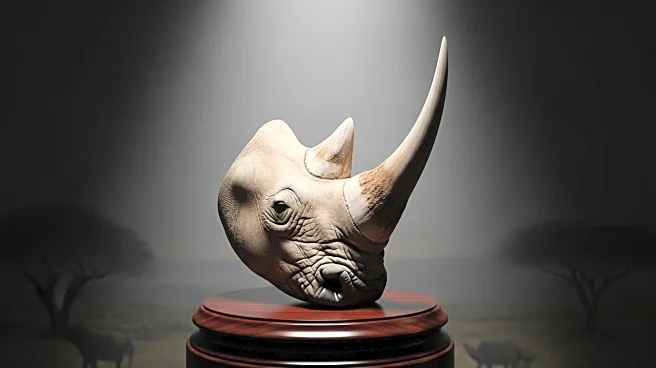What is the story about?
What's Happening?
South Africa commemorated World Rhino Day, highlighting both progress and ongoing challenges in rhino conservation. Despite a decrease in poaching rates, the country still loses one rhino daily to poachers. South Africa, home to the largest populations of black and southern white rhinos, plays a crucial role in their conservation. Efforts to protect these species include high-tech anti-poaching measures such as drones, night surveillance, and tracking devices. Conservationists continue to face challenges, with 195 rhinos killed in the first half of the year. Initiatives like Operation Rhino, which relocates rhinos to safer areas, are being revived to bolster populations.
Why It's Important?
The ongoing threat of rhino poaching in South Africa has significant implications for global biodiversity and conservation efforts. Rhinos are critical to their ecosystems, and their loss could disrupt ecological balance. The high demand for rhino horns in illegal markets poses a challenge to conservationists, who must continually innovate to protect these animals. The success of conservation efforts in South Africa could serve as a model for other countries facing similar challenges. The collaboration between public and private sectors in South Africa demonstrates a potential pathway for effective wildlife protection.
What's Next?
Conservationists are exploring new methods to combat poaching, including the use of radioactive material in rhino horns to deter illegal trade. The continuation of relocation programs like Operation Rhino aims to establish new breeding populations and enhance protection. The ongoing collaboration between government and private reserves is expected to strengthen anti-poaching strategies. Monitoring and adapting these efforts will be crucial in reducing poaching rates further and ensuring the survival of rhino species.
Beyond the Headlines
The ethical implications of rhino conservation highlight the need for sustainable practices that balance human interests with wildlife protection. The use of technology in conservation raises questions about privacy and the impact on local communities. Long-term success in rhino conservation could influence global policies on wildlife protection and trade regulations. The cultural significance of rhinos in South Africa underscores the importance of preserving these iconic species for future generations.















